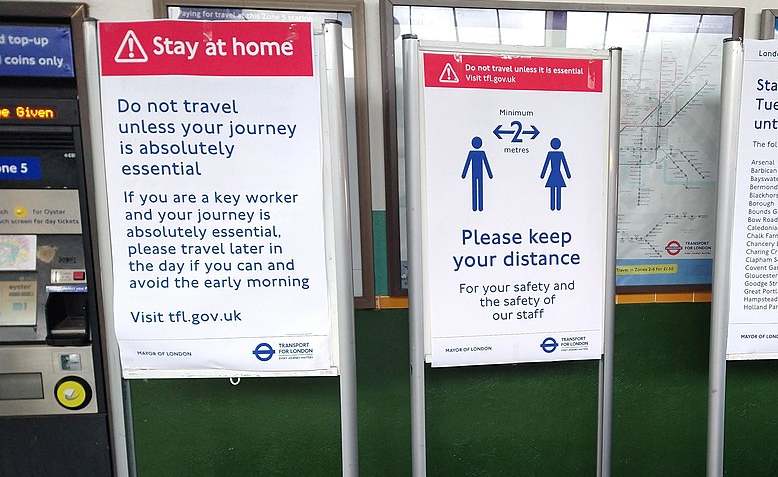 TfL ran services all through the Lockdown. Here are some Coronavirus safety notices. Photo: Philafrenzy / Wikimedia Commons / cropped original image / licensed under CC 4.0, linked at bottom of article
TfL ran services all through the Lockdown. Here are some Coronavirus safety notices. Photo: Philafrenzy / Wikimedia Commons / cropped original image / licensed under CC 4.0, linked at bottom of article
This critical campaign provides a model to the kind of movement that will be needed to protect jobs and win improved public services, says Kate O’Neil
Last night over 300 viewers tuned in to an online rally by RMT, ASLEF, TSSA and Unite, all the unions representing employees of Transport for London. It was the first such joint event in several years, and organisers hope it will be the first of many in the months to come.
The rally was called in anticipation of major cuts to jobs and services due to a drastic reduction in TfL’s revenues during the pandemic, as passenger numbers dwindled and fares were suspended. So far, the government has signalled it will make both TfL employees and passengers pay for the budget deficit. The £1.6 billion bailout package it issued in May not only falls well short of the funding needed, it required TfL to raise fares, stop free travel passes for under-18s and restrict free travel for over-60s.
TfL was also forced to accept two government officials onto the TfL board, who have already hired KPMG, a notorious job- cutting consulting firm, to advise on TfL’s reorganisation. And TfL has been starved for years. Since Tories cut its yearly £700 million stipend in 2015, London is now the only European capitol whose transport network is not subsidised by a national government.
The new union campaign, called ‘Protect our Transport: Keep London Moving,’ is opposing all cuts to transport services, cuts to jobs and deterioration of terms and conditions for TfL workers. It is also demanding the full restoration of government subsidies to TfL and a ‘fully funded, green, integrated and accessible public transport system that meets air quality targets.’
These demands are a tall order, but the rally showed there exists a strong feeling of anger and a willingness to fight among workers. Speaker after speaker spoke of the injustice felt by TfL staff that they had put their lives on the line during the lockdown, only to have their livelihoods on the line now. Many spoke of the workers who had died from COVID, disproportionately of BAME background, and viewers even observed a minute of silence for lost colleagues. Others mentioned the gross hypocrisy of the Tories, who are handing out no-strings-attached money to private train companies while placing stringent cuts on TfL, a public service. And no one missed the chance to call out Johnson’s blatant opportunism in using the crisis to gain more power over the network.
The ‘Protect our Transport’ campaign represents some important steps forward for trade unions in the sector. Firstly, each union spelled out the importance of unity in action. As Michelle Rogers, the president of RMT, said, ‘We don’t always agree, however we have to work together to win this.’ There was also a palpable readiness for an all-out battle, with several speakers claiming a collective strike was in the cards. Secondly, it is significant that the rally took place well ahead of the next TfL budget announcement; the unions are thinking ahead. Finn Brennan, the ASLEF district organiser for the London Underground, explained how his team had already asked for a ‘cast-iron guarantee’ from TfL that there would be no cuts, and as they have not received it, they are ‘moving quickly’ to initiate dispute themselves.
Finally, the campaign is clearly aiming to link industrial action with a broader class struggle for a safer, more equitable and more sustainable transport system. Peter Kavanagh, Unite’s London Regional Secretary, spoke of the need for an ‘external-facing campaign’, in which the unions would work with community and environmental advocacy groups. The rally itself included speeches by community activists. Cheryl Beckford, a Unite equalities rep, reminded viewers that BAME staff and communities will be worst affected by cuts to jobs and services.
Paula Peters, from Disabled People Against Cuts, explained how service cuts would delay new disabled access projects in rail and tube stations and pointed out that government proposals for driverless trains were dangerous, especially for disabled riders. Oisin Mulholland, a youth activist from Prospect, showed eloquently how loss of the free travel pass would not only make it harder for working class children to get to school, it would also limit their opportunities to learn outside the classroom, by visiting museums and attending cultural events.
This campaign is a critical fight for all Londoners, and it could provide a model for the kind of movement—inside and outside the workplace– that will be needed to protect jobs and win improved public services in other sectors coming out of the COVID crisis. Watch this space and be prepared to get your solidarity on board!
Join Revolution! May Day weekender in London
The world is changing fast. From tariffs and trade wars to the continuing genocide in Gaza to Starmer’s austerity 2.0.
Revolution! on Saturday 3 – Sunday 4 May brings together leading activists and authors to discuss the key questions of the moment and chart a strategy for the left.

